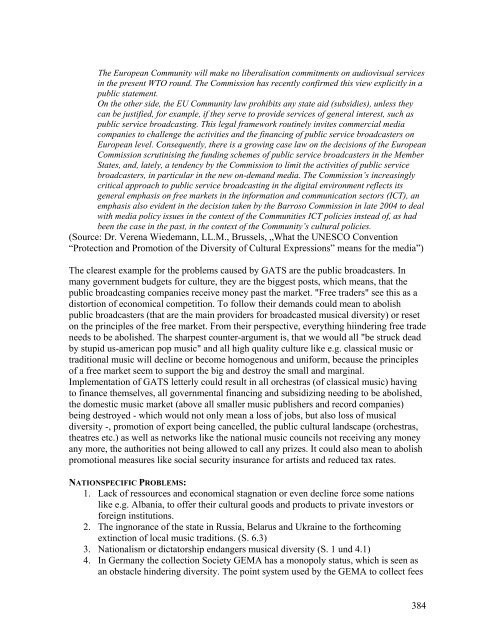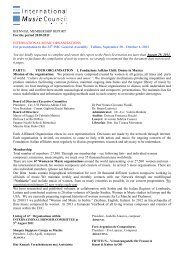Appendix 6 - International Music Council
Appendix 6 - International Music Council
Appendix 6 - International Music Council
You also want an ePaper? Increase the reach of your titles
YUMPU automatically turns print PDFs into web optimized ePapers that Google loves.
The European Community will make no liberalisation commitments on audiovisual services<br />
in the present WTO round. The Commission has recently confirmed this view explicitly in a<br />
public statement.<br />
On the other side, the EU Community law prohibits any state aid (subsidies), unless they<br />
can be justified, for example, if they serve to provide services of general interest, such as<br />
public service broadcasting. This legal framework routinely invites commercial media<br />
companies to challenge the activities and the financing of public service broadcasters on<br />
European level. Consequently, there is a growing case law on the decisions of the European<br />
Commission scrutinising the funding schemes of public service broadcasters in the Member<br />
States, and, lately, a tendency by the Commission to limit the activities of public service<br />
broadcasters, in particular in the new on-demand media. The Commission’s increasingly<br />
critical approach to public service broadcasting in the digital environment reflects its<br />
general emphasis on free markets in the information and communication sectors (ICT), an<br />
emphasis also evident in the decision taken by the Barroso Commission in late 2004 to deal<br />
with media policy issues in the context of the Communities ICT policies instead of, as had<br />
been the case in the past, in the context of the Community’s cultural policies.<br />
(Source: Dr. Verena Wiedemann, LL.M., Brussels, „What the UNESCO Convention<br />
“Protection and Promotion of the Diversity of Cultural Expressions” means for the media”)<br />
The clearest example for the problems caused by GATS are the public broadcasters. In<br />
many government budgets for culture, they are the biggest posts, which means, that the<br />
public broadcasting companies receive money past the market. "Free traders" see this as a<br />
distortion of economical competition. To follow their demands could mean to abolish<br />
public broadcasters (that are the main providers for broadcasted musical diversity) or reset<br />
on the principles of the free market. From their perspective, everything hiindering free trade<br />
needs to be abolished. The sharpest counter-argument is, that we would all "be struck dead<br />
by stupid us-american pop music" and all high quality culture like e.g. classical music or<br />
traditional music will decline or become homogenous and uniform, because the principles<br />
of a free market seem to support the big and destroy the small and marginal.<br />
Implementation of GATS letterly could result in all orchestras (of classical music) having<br />
to finance themselves, all governmental financing and subsidizing needing to be abolished,<br />
the domestic music market (above all smaller music publishers and record companies)<br />
being destroyed - which would not only mean a loss of jobs, but also loss of musical<br />
diversity -, promotion of export being cancelled, the public cultural landscape (orchestras,<br />
theatres etc.) as well as networks like the national music councils not receiving any money<br />
any more, the authorities not being allowed to call any prizes. It could also mean to abolish<br />
promotional measures like social security insurance for artists and reduced tax rates.<br />
NATIONSPECIFIC PROBLEMS:<br />
1. Lack of ressources and economical stagnation or even decline force some nations<br />
like e.g. Albania, to offer their cultural goods and products to private investors or<br />
foreign institutions.<br />
2. The ingnorance of the state in Russia, Belarus and Ukraine to the forthcoming<br />
extinction of local music traditions. (S. 6.3)<br />
3. Nationalism or dictatorship endangers musical diversity (S. 1 und 4.1)<br />
4. In Germany the collection Society GEMA has a monopoly status, which is seen as<br />
an obstacle hindering diversity. The point system used by the GEMA to collect fees<br />
384



